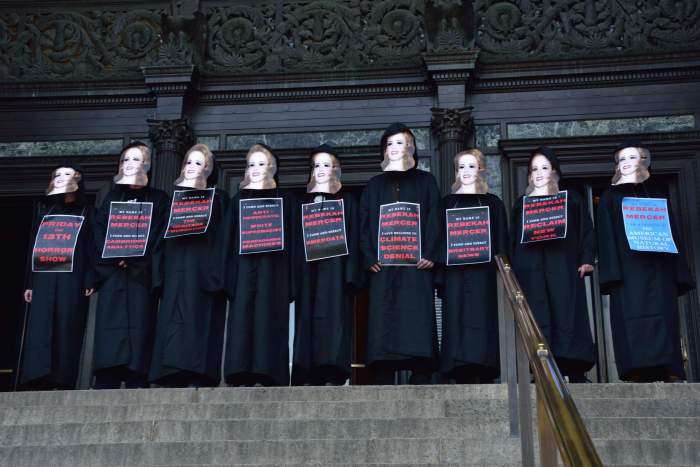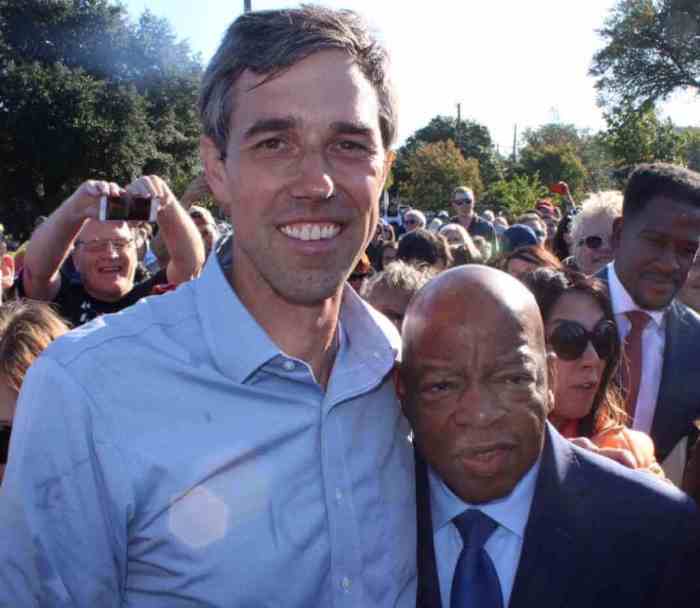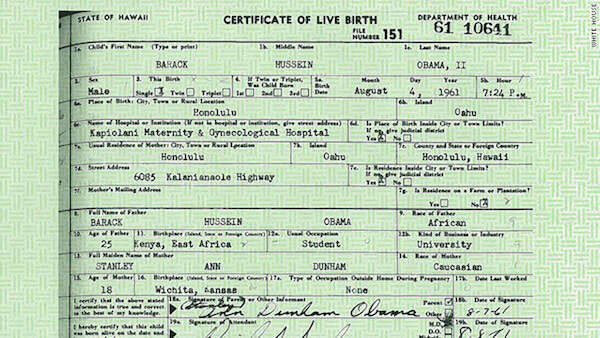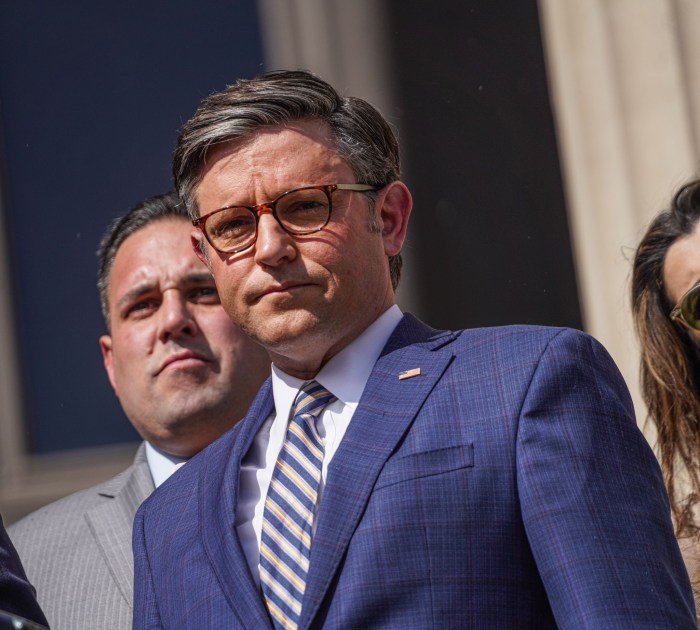A long time ago in a galaxy far, far away — America in the 1950’s — “homosexuality” was “the unspeakable.” Oh sure, everyone “gossiped” about “who was” and “who wasn’t,” but such talk wasn’t considered part of “polite conversation.”
Only a decade or two before, Djuna Barnes’ Sapphic cri de coeur “Nightwood” (which my husband insists was passed out to prospective “girltoys” as they arrived at the Port Authority Bus Terminal) was on every soigne hipster’s bookshelf, and “the pansy craze” made male effeminacy fashionable among the trend-conscious,” as featured the incredible last scene of George Cukor’s “Our Betters” (1933), where one of “them” shows a group of society women how to walk.
Then came World War II, where countless soldiers and sailors discovered that the “strange twilight urges” they found themselves subject to were shared by ever-so-many others. When it was all over, so were the good times, as these same GIs, instead of enjoying “The Best Years of Our Lives,” found themselves branded as civilian “neurotics” by the newly-empowered psychiatric establishment, and “sex criminals” by the police, who were given to arrest all and sundry at any place where “they” gathered — be it a public bar or a private home. Hence the “vice” arrest of a young Tab Hunter.
Needless to say in an atmosphere like this, the notion of being “openly gay” was far beyond the pale. You could lose your job, you could lose your home, and if you were under 21 your parents could throw you out of the house. Such calamities, of course. persist in one form or another, but today’s LGBTs can gather publically and privately quite legally. For that we have Stonewall to thank. But the past shouldn’t be swept aside as mere history, as we have still much to learn from it, especially now as we suffer from what Michelangelo Signorile, “It’s Not Over,” calls “victory blindness” — the illusion that the ground we’ve gained is stable, when we need to fight to maintain it 24/ 7. We’re not going back, but we may well go “sideways,” in a culture that still wants to ignore our existence as it did in the “before time” — which is why we need to look back, less in anger than with care and consideration.
It’s not that “LGBT” wasn’t present pre-Stonewall. It resided “under the radar,” both by choice and design. Christine Jorgensen’ sexual reassignment surgery made headlines, but there was little interest in other transgender people — even though many were hiding in plain sight. Billy Tipton, a popular jazz musician, lived as a man and had several common-law wives, his biological gender not discovered until after his death in 1989.
Serious literature dealing with those other than heterosexual was likewise carefully buried. Charles Jackson’s 1944 novel “The Lost Weekend” mentioned gayness in passing as a spur to its anti-hero’s alcoholism, but thanks to the Motion Picture Production Code it was impossible for Billy Wilder to include it in his film adaptation made the following year.
And speaking of film, Todd Haynes’ “Carol,” an adaptation of Patricia Highsmith’s “The Price of Salt,” dramatizes a clandestine lesbian love affair that slips beneath the socio-political radar of the early ‘50s — as did the novel itself. Written by Highsmith immediately after her breakthrough debut “Strangers on a Train,” “The Price of Salt” was published by a small press, its author identified as Claire Morgan. It could never have reached the screen in the 1950s, and rests there uneasily today in the eyes of those who find the past difficult to comprehend. In other words. it’s not the lesbian “Brokeback Mountain.” It’s a lot subtler and more complex than that.
Highsmith largely played by the rules of her time, even while trying fitfully to bend them in her writing. She touched on lesbian sexuality in only two of her other novels. Others faced off against the status quo, as best they could more forcefully. The early gay and lesbian organizations, the Mattachine Society and the Daughters of Bilitis, being subject to arrest, met in secrecy. They documented their activities and published position papers in small press journals like One Magazine, whose authors wrote under pseudonyms, and such works were frequently confiscated by the authorities.
What most interested these political pioneers most was gay history and the gay world that surrounded them, however hidden it might be. Consequently, several Mattachine members were tasked with combing through newspapers and magazines to divine anything of potential LGBT interest, even though such subjects were essentially never labeled so in the press. This was no simple matter as Jim Kepner’s encyclopedic 1998 account “Rough News, Daring Views” shows.
But that’s all changed now. As Mike Nichols once quipped that homosexuality was once “‘the love that dare not speak its name. Now it won’t shut up.” And in his television adaptation of Tony Kushner’s “Angels in America,” Nichols helped “it” speak more loudly and more resolutely than ever.
Gayness is everywhere now, but in pre-Stonewall America “coming out” wasn’t merely avant-garde socially, it was dangerous legally and sometimes ruinous psychologically. Many gay and lesbians had a hard time coming out to themselves. It took at least two decades post-Stonewall for things to loosen up, with the out and proud being not just political radicals but everyday citizens and — of even more import for this culture, “celebrities.” But is this new outness more apparent than real.
Out lesbian tele-journalist Rachel Maddow covers LGBT issues with more depth than any public personality save for Ellen DeGeneres, whose lightweight entertainment show is never chary of mentioning the LGBT whenever its out host finds it pertinent. But then there are such “outies” as Anderson Cooper, Thomas Roberts, Don Lemon, Steve Kornacki. Skillful tele-journalists all, they rarely touch on gay issues even when they’re close to the action, as when Florida Senator Marco Rubio had a confrontation with a gay man, Timothy Kierstead, who was eating with his husband in a restaurant in New Hampshire, which enacted marriage equality legislatively seven years ago. Rubio didn’t perform well — though he may have been oblivious to the shortcomings in his response to Kierstead.
Kierstead: “I’m a gay man, already married. I’m already married, have been for a long time. And you want to say that we don’t matter.”
Rubio: “No, I just believe that marriage is between one man and one woman.”
Kierstead: “But that’s your belief. Not half of the country’s.”
Rubio: “Well I think that’s what the law should be. I think you should have the law changed by the legislature. I believe that —”
Kierstead: “But the law already happened.”
Rubio: “I respect your opinion.”
Kierstead: “Yeah, yeah. Typical politician. Marco Rubio… walk away”
So it’s nice that David Geffen, Neil Patrick Harris, Jim Parsons, Nathan Lane, Victor Garber, Jesse Tyler Ferguson, Tim Cook, and — after a life largely spent in the closet —Jodie Foster are out. As we used to say “the personal is political.” But now for the personal to be political something more is needed — especially as backlash has set in with a vengeance.
Under the specious ideological umbrella of “religious freedom,” a number of states have made noise about adopting laws that would foreclose the option of meaningful nondiscrimination protections ever being instituted (there are not yet any nationwide civil rights protections) and could also be used to erode established freedoms in areas like marriage equality. It’s obvious that no religion opposed to it is under any obligation to marry same-sex couples — and as distasteful and even frightening as it may be, no religious body can be prevented from proselytizing against LGBT people in any way they wish — but that’s not enough for them. Organized religion is fading fast, and as we all know a wounded animal is more dangerous than a healthy one.
In Georgia, a law is advancing through the legislature that could be used to justify discrimination not only against LGBT people, but unwed mothers and other unpopular minorities by those claiming to exercise their “freedom” but really want to terrorize everyone who doesn’t fall into line. “Religious freedom” could be used to enable foster families to submit an LGBT child to “conversion therapy” or shame and deny service to an unwed pregnant women without fear of government intervention or license suspension. It would even allow individuals to refuse to carry out the terms of a state contract for providing counseling services to all eligible individuals, based on the counselor’s religious beliefs.
In Kentucky, where county clerk Kim Davis famously caused a ruckus by refusing to issue marriage licenses to same-sex couples, a bill is in play that would create a second, separate — and of course unequal — license form for “Applicant One” and “Applicant Two” so that “ traditional families” are not “disrespected” by losing their right to still be acknowledged as “Bride” and “Groom.”
How this plays out has yet to be seen. But Georgia has already been warned of a mass exodus of businesses from the state should it go down the road that blew up in Indiana’s face a year ago.
And that brings us to boxer Manny Pacquiao, whose declaration that gays and lesbians deserve death has led to his being dropped as spokesmodel for Nike.
“I am not condemning the LGBT,” Pacquiao claimed in remarks identical to those of every ‘phobe who has used “hate the sin, love the sinner” to justify their bigotry. “What I am condemning is the act. I’m happier because I’m telling the truth… It’s worse if we will hide the truth. I’m happier that a lot of people were alarmed by the truth.”
The truth is that “the act” is anal intercourse — which is all “homosexuality” amounts to for those who hate LGBT people. We are not people. We have no lives. We have no loves. We have only “the act.” And for that, according to Kevin Swanson, a pastor who hosted Ted Cruz, Mike Huckabee, and Bobby Jindal at the National Religious Liberties Conference in Des Moines on November 6 and 7, 2015, we must die.
We have of course faced death already. The AIDS pandemic — a health disaster Swanson and his ilk have doubtless enjoyed ( he speaks of activists “putting happy faces on running sores!”) — has not killed us off. Neither have his threats. It will take time and money better spent elsewhere to defeat “religious freedom.” But to quote a famous heterosexual, Friedrich Nietzsche, “That which does not kill me makes me stronger.”
And we’re stronger than ever. What we must do now is act on that strength.


































